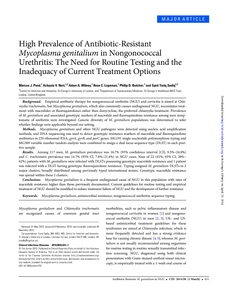Pond, MJ; Nori, AV; Witney, AA; Lopeman, RC; Butcher, PD; Sadiq, ST
(2014)
High Prevalence of Antibiotic-Resistant Mycoplasma genitalium in Nongonococcal Urethritis: The Need for Routine Testing and the Inadequacy of Current Treatment Options.
CLINICAL INFECTIOUS DISEASES, 58 (5).
631 - 637.
ISSN 1058-4838
https://doi.org/10.1093/cid/cit752
SGUL Authors: Butcher, Philip David Sadiq, Syed Tariq Witney, Adam Austin Pond, Marcus James
![[img]](https://openaccess.sgul.ac.uk/104660/1.hassmallThumbnailVersion/Clin%20Infect%20Dis_2014_Pond_631_7.pdf)  Preview |
|
["document_typename_cannot open `/data/SGUL/sgul/eprints3/archives/sgul/documents/disk0/00/10/46/60/01/Clin' (No such file or directory)
cannot open `Infect' (No such file or directory)
cannot open `Dis_2014_Pond_631_7.pdf' (No such file or directory)" not defined]
Published Version
Available under License St George's repository terms & conditions.
Download (293kB)
| Preview
|
Abstract
Background. Empirical antibiotic therapy for nongonococcal urethritis (NGU) and cervicitis is aimed at Chlamydia trachomatis, but Mycoplasma genitalium, which also commonly causes undiagnosed NGU, necessitates treatment with macrolides or fluoroquinolones rather than doxycycline, the preferred chlamydia treatment. Prevalence of M. genitalium and associated genotypic markers of macrolide and fluoroquinolone resistance among men symptomatic of urethritis were investigated. Genetic diversity of M. genitalium populations was determined to infer whether findings were applicable beyond our setting. Methods. Mycoplasma genitalium and other NGU pathogens were detected using nucleic acid amplification methods, and DNA sequencing was used to detect genotypic resistance markers of macrolide and fluoroquinolone antibiotics in 23S ribosomal RNA, gyrA, gyrB, and parC genes. MG191 single-nucleotide polymorphism typing and MG309 variable number tandem analysis were combined to assign a dual locus sequence type (DLST) to each positive sample. Results. Among 217 men, M. genitalium prevalence was 16.7% (95% confidence interval [CI], 9.5%-24.0%) and C. trachomatis prevalence was 14.7% (95% CI, 7.8%-21.6%) in NGU cases. Nine of 22 (41%; 95% CI, 20%-62%) patients with M. genitalium were infected with DLSTs possessing genotypic macrolide resistance and 1 patient was infected with a DLST having genotypic fluoroquinolone resistance. Typing assigned M. genitalium DLSTs to 2 major clusters, broadly distributed among previously typed international strains. Genotypic macrolide resistance was spread within these 2 clusters. Conclusions. Mycoplasma genitalium is a frequent undiagnosed cause of NGU in this population with rates of macrolide resistance higher than those previously documented. Current guidelines for routine testing and empirical treatment of NGU should be modified to reduce treatment failure of NGU and the development of further resistance.
Statistics
Item downloaded times since 23 Apr 2014.
Actions (login required)
 |
Edit Item |




